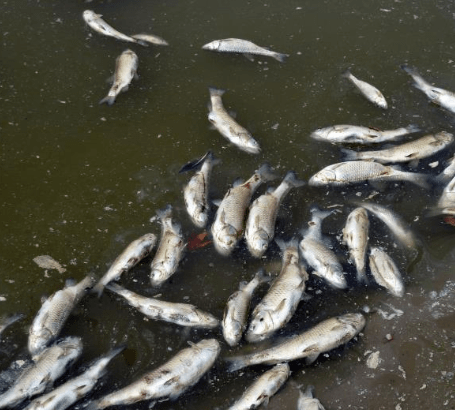
An investigation conducted by the National Oil Spills Detection and Response Agency has revealed a concerning connection between toxic waste and the discovery of dead fishes along the coastline of the Atlantic Ocean.
The agency’s findings indicate a high level of toxicity in the dead fishes, likely caused by waste discharge from domestic and industrial sources that find their way into the water body.
Director-General of NOSDRA, Idris Musa, clarified that the laboratory tests did not show hydrocarbons (oil) as the likely cause of the fishes’ death.
He elaborated on the findings, stating;
“The results of the laboratory tests were examined to provide clarity and understanding on the analyzed parameters of concern.
“The findings did not indicate hydrocarbons (oil) as the likely cause of the fishes’ death.
“While Total Petroleum Hydrocarbons, Polycyclic Aromatic Hydrocarbon, Benzene, Toluene Ethylene and Xylene were within regulatory standard limits, certain heavy metals such as cadmium, chromium copper, zinc, and iron were found to exceed the regulatory standard limits in the coastlines of Delta, Bayelsa, and Rivers states.
“It was observed that industrial and domestic waste containing these heavy metals, found their way into drainages and eventually transferred to the water bodies, posing a deleterious impact on aquatic species, mammals, and human beings.
“This impact may be attributed to sources such as batteries, galvanized pipes, fertilizers, sewage sludge, and plastics.
“The analyses of dead fishes found at the coastline in Delta and Bayelsa revealed the presence of chromium in fish tissue, and copper was found in fish tissue sampled in Delta State but not in those of Bayelsa and Rivers State.
“It is unlikely that a sudden release of heavy metals would directly cause the death of fishes, except for those trapped at the point of release, as cadmium, in particular, is highly toxic.
“The accumulation of heavy metals over the long term (chronic) rather than short term (acute) exposure is more likely to cause the death of fishes. Moreover, the specific species of fish allegedly involved in this situation remains a point of interest.”
In addition, the federal government has been urged to intensify efforts to monitor illegal fishing activities in Nigeria’s territorial waters in order to prevent the dumping of waste and the introduction of unwanted aquatic species.
